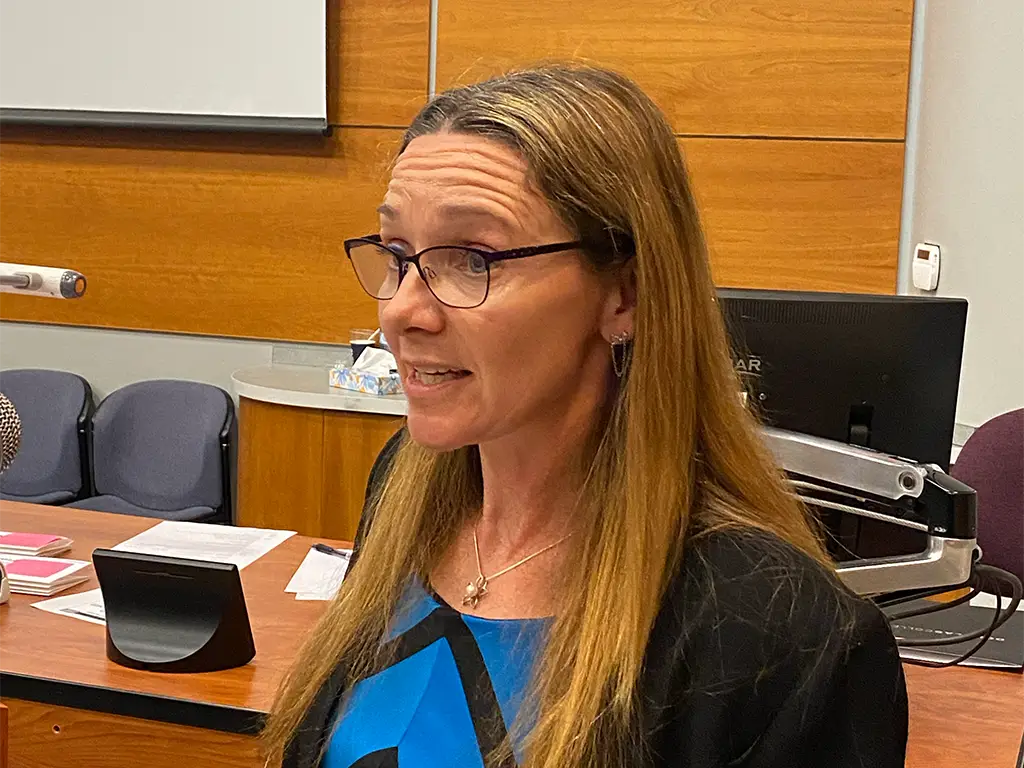“The CHIM is the pathway designation.”
On January 31, 2023, CEO and Registrar Jeff Nesbitt, BA, MBA, ICD.D, met with first- and second-year students of Douglas College’s Health Information Management Diploma program.
This meeting was facilitated by Pat Visosky, MSc, Ph.D., CHIM, CHIMA’s board chair and the program’s coordinator. It provided an opportunity to discuss exciting trends in health information management and the future of the profession.
Students shared their excitement for data quality improvement and their ability to produce quality data that informs the quality of care. They inquired about CHIMA’s significant projects, the intersection between AI and medical coding, and exam preparation.
Nesbitt informed the students of the recent endorsement of the College’s certification by the Canadian Institute for Health Information (CIHI), highlighting the importance of this event in increasing the legitimacy of the profession, elevating health data literacy, and propelling the profession toward broader areas of practice.
While discussing these areas of practice, Nesbitt pointed out the significance of health information professionals in non-traditional sectors, such as the justice and legal systems. He urged the students to look beyond job titles and instead focus on competencies, noting that plans are underway to create micro-credentials that will complement the Certified in Health Information Management (CHIM) designation and prepare CHIM professionals for health roles and beyond, where industries require their distinct skills (privacy, informatics, data analytics, etc.). “The CHIM is the pathway designation,” said Nesbitt, also announcing that student members will be able to view the CHIMA job board shortly.
Appreciating this news and echoing Nesbitt, Dr. Visosky advised students to go beyond health care to industries where their strengths lie, saying that “the light is being shone on” health information professionals.
Nesbitt noted that health data has been the subject of dinner table conversation, and there is a growing recognition that certified health information professionals contribute to public trust through standards in health data literacy in Canada, causing certification to be more impactful and recognized. He added that CHIMA is on the journey toward this future through its advocacy efforts with advisory groups, health authorities, and academic institutions, amongst others. “This is important because we need to improve on infrastructure, interoperability, and policy,” said Nesbitt.
He encouraged participation in the workforce study to further their knowledge of the various opportunities available, stating that participants would receive a state-of-the-profession document with additional information on job families.
A commitment to life-long learning facilitates the opportunities available to CHIM professionals. CHIMA’s manager of health information operations, Alisha Peto, CHIM, CCDIS, explained that the College’s continuing professional education program is set up to support professional development. She stressed the importance of updating skills: “Think outside of the box because a lot of the time, you don’t really realize what you’re interested in until you learn about it a little bit more… This is the type of profession that will always need that continuous learning and upgrading. I encourage you to be curious.”
Addressing concerns regarding the CHIM national certification examination (NCE), Peto advised the students on preparation tools (resulting in higher pass rates) and the College’s modernized and accessible examination proctoring system.
CHIMA wishes to thank Dr. Visosky and the HIM faculty at Douglas College for their warm reception.






